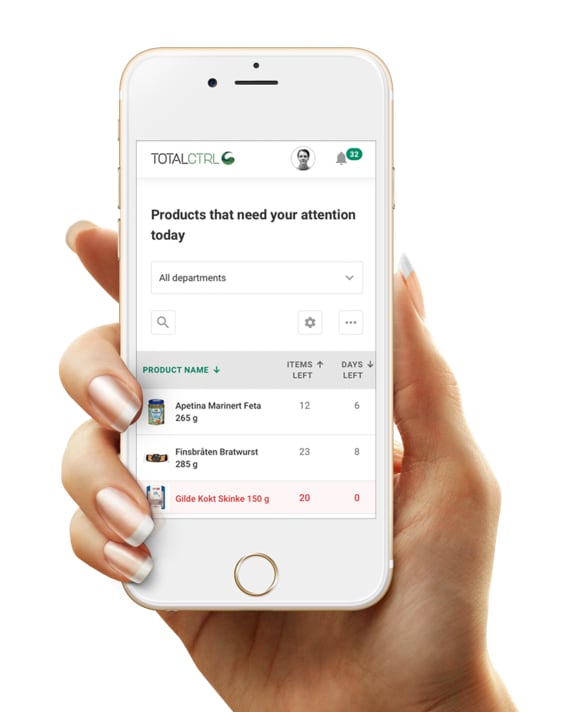TotalCtrl co-founders Charlotte Aschim and Ingrid Østby were first exposed to the eye-opening scale of food wasted in retail while working at grocery stores.
At the end of each working day, the supermarket employees were required to traipse the aisles looking for food that was either on their last legs, or past expiry.
“Every day we ended up with a lot of food that we had to waste,” CEO and co-founder Charlotte Aschim told FoodNavigator. This food was discarded into landfill.
Fast-forward seven years, and Aschim said while “a lot of time has passed, not much has changed”.
Indeed, despite rising food poverty rates, global food waste remains of critical concern. The United Nations estimates 1.3bn tonnes of food is lost or wasted each year – equating to roughly one-third of the food produced for human consumption.
The fall-out also hits the corporate bottom line. Food loss and waste amounts to roughly €592bn per year in industrialised countries.
While a number of retail players have committed to tackling the issue – initiatives include the upcycling of surplus baguettes and batons into new bakery products, and pledges to halve food waste by 2030 – Aschim suggested the solution could be simpler than imagined.
TotalCtrl’s proposal – a data management software for consumer-facing businesses such as supermarkets, food banks, restaurants, and hotels – claims to cut the time retailers spend managing food waste in half, with ‘huge’ financial gains.
Automation: Bringing an ‘extremely traditional’ sector up to speed
While working at the grocery store, Aschim created a ‘manual date book’ – a physical list of products and their expiry dates. The idea was to reduce the time employees spent ‘looking at everything in an aisle’ for expired foodstuffs.

“It worked,” the co-founder told this publication. “It reduced a lot of the time spent doing that routine and gave us better control over what we had [in stock] and where we needed to place it – to ensure it sold quickly [if approaching its use-by date].”
In 2017, having completed her studies and developed skills in IT and coding, Aschim returned to this manual date book idea and started creating a digital version.
The result, sold under the TotalCtrl company she founded with Østby in December of that year, is a software solution for any device, be it desktop, tablet, or smartphone.
“We are dealing with an extremely traditional industry, so we are starting by digitalising a manual process,” explained Aschim.
The offering connects to their clients’ existing inventory systems, such as Enterprise Resource Planning (ERP) software. If the client’s inventory is missing any expiry dates, TotalCtrl employs its ‘trade secret’ – the algorithms behind the expiration dates – to link the two systems and fill-in blanks.
“Once we have their existing inventory data, we do our magic. Our clients don’t need to scan anything,” Aschim explained. TotalCtrl also connects to its client’s cashier system, allowing the software to reduce the inventory automatically as items are sold. “This means that we have control over both inventory and expiration date.”
TotalCtrl’s software then visually communicates to employees and managers which items are in-store, when they are due to expire, and where they are located. The client is also alerted in advance if products are approaching expiry.
Saving time, money...and food!
Ultimately, “it helps the employees and managers to go directly to particular items that needs to be dealt with the fastest”, the co-founder explained.
This means that employees are alerted when they can continue to sell a product at full value, and when it is time to discount the item and change its location – “where it may be easier for consumers to grab while in the store”.
The solution offers ‘huge benefits’ to companies’ bottom line – the TotalCtrl website even offers a return on investment (ROI) calculator for businesses to estimate their savings. “Businesses can input the revenue of their store, and receive feedback on how much time, money and food they would save by using TotalCtrl,” we were told.
One such success story, Aschim recounted, was a local grocery in Norway with a revenue of approximately €500,000. The store’s food waste accounted for 2-4% of that revenue. “There was a lot of money that could be saved.
“We were able to reduce that waste by 85%, as well as reduce time and the money spent on labour costs by 90%.”
Further, the software enabled the company in question to ‘purchase smarter’, she continued. “They have increased their sales. The more control they had over their inventory base and expiration dates, the easier it is was for them to sell faster.
“Having that control over inventory based on expiration dates gives them so much value.”
“At the moment, we are totalling between 50-80% reduction in food waste. The goal is to have every client reach, fairly quickly, an 85% reduction in food waste.” – Charlotte Aschim, CEO and co-founder of TotalCtrl.
Scaling up: Scandinavia, Europe and beyond
In the long-term, TotalCtrl has its eyes set well beyond the 85% reduction in food waste. “Our goal is to eliminate food waste throughout the entire value chain,” Aschim revealed.
It is for this reason that the start-up its focusing on grocery chains. “They have such an impact on the entire value chain. They influence everything, down to the farmer and up to the consumer.
“In every country they have a lot of power. If you [can effect change] there, you can effect a lot more than if you start somewhere else in the value chain.”
However, the CEO lamented frustration at trying to break into the major supermarket chains. “Because of the power they have, they are not urgently looking for solutions.”

Alongside grocery stores, TotalCtrl is also selling to municipalities, food banks, hotels and restaurants in Norway, Denmark, Sweden and Finland.
The start-up is not the first on the food waste innovation scene, with Scandinavia-based Whywaste and Deligate also operating in the space. However, Aschim was confident her solution offered more automation and time saving than her competitors.
“There is still a lot of scanning and manual typing to do in their systems, while we have removed that part.
“Since we have worked in [grocery stores], we understand that adding additional typing or scanning to the [daily] routines [wouldn’t be well received]. Store managers run around like crazy every day [as it is]. We needed to make sure that our solution was something that would reduce the time spent on this.”
Expansion is on the cards for the Norwegian duo, who want to boost its customer base to ensure a ‘good footing’ in Europe before it increases its presence beyond. “Our focus is to scale and make sure that we use our time as best as we can, to make the impact that we want in a short amount of time,” we were told.
The start-up recently learned it had been accepted into EIT Food’s accelerator hub programme in Cambridge, UK. Along with 53 other agri-food start-ups, across five locations including Israel, Switzerland, Spain and Germany, TotalCtrl will benefit from infrastructure support, prototyping facilities, and business advice.
The team hopes the accelerator will help bring “new customers, new contacts, and new relationships to help expand our network and help the business scale.
“[EIT Food] has a good network, good expertise, they know how to scale businesses and that is what we need to learn more about.”





